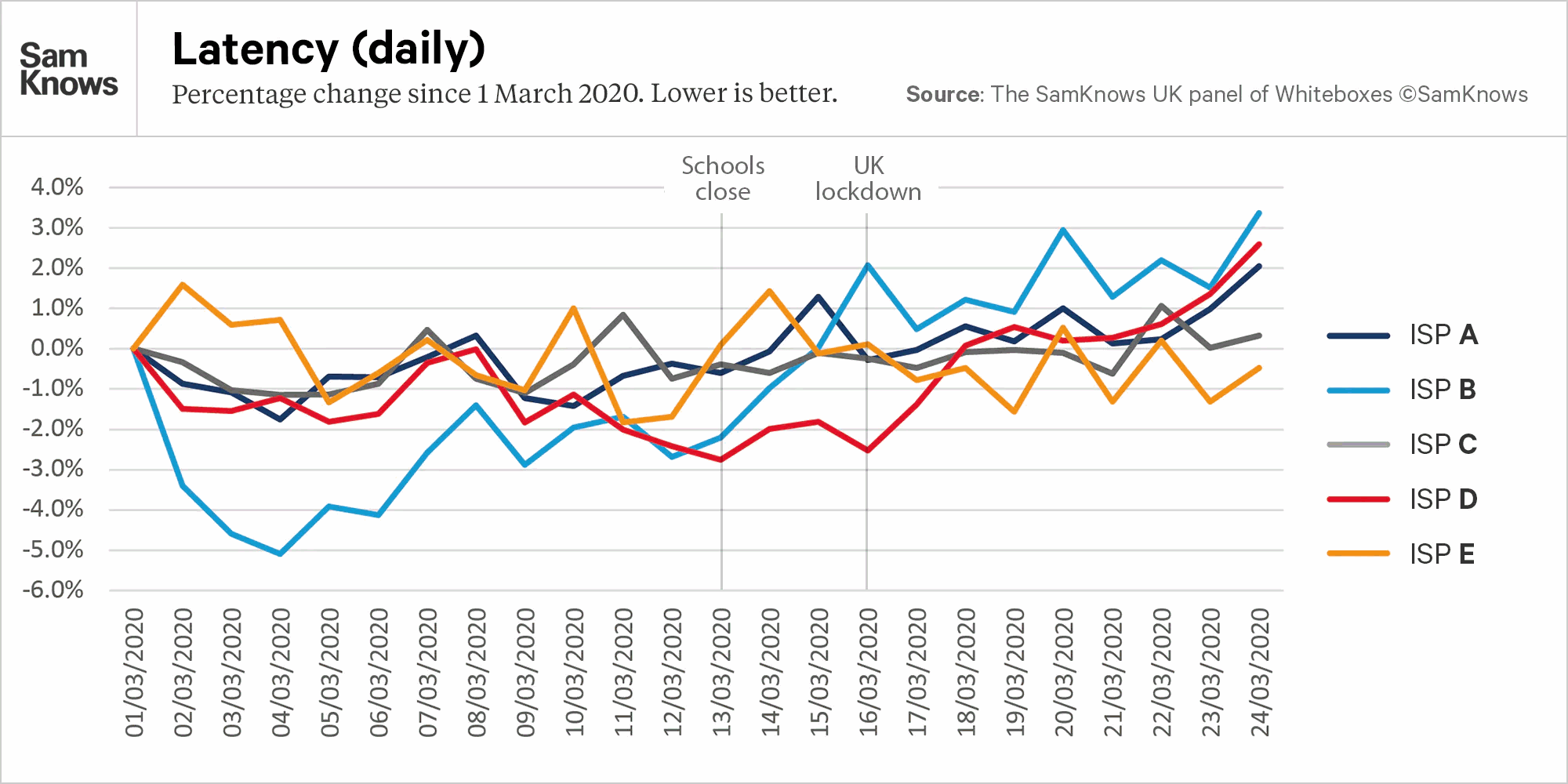COVID-19 – SamKnows Shows Broadband ISP Impact of Lockdown

A new study from UK internet connection testing experts at SamKnows has revealed that some of the market’s largest broadband ISPs did suffer a performance decrease in both download speed and latency times since the Coronavirus (COVID-19) lockdown began, but the change is only around -2% to -3%.
So far we haven’t seen any major reports of slow broadband speeds as a result of rising demand on domestic services, at least nothing above the usual level of gripes. The reason for this is because most networks are built to cope with many times above their normal load. Nevertheless SamKnows has identified a small variation.
The reason this new data is so useful is because of how SamKnows conducts their testing, which involves installing around 4,000 “whiteboxes” (modified routers) into homes across the United Kingdom in order to conduct scientific measurements. The advantage of this is that it can accurately test the broadband connection between ISPs and homes, while also being able to filter out issues caused by local network congestion and slow WiFi etc.
Advertisement
The approach taken is thus significantly more accurate than web-based broadband speedtests, which as above can suffer from all sorts of pitfalls that may otherwise cloud the usefulness of their results. The downside is that deploying such kit into homes is expensive and thus the sample size is very small, although Ofcom still uses the same data for their annual fixed broadband ISP speeds report (here).
The Whitebox Results
The results below generally cover the March 2020 period and sadly SamKnows has opted to anonymise the names of ISPs they’ve tested, probably to avoid upsetting them as some are clients (obviously this includes all of the major providers). Likewise the study is not concerned with individual packages or absolute performance and has thus chosen to present the general impact as a percentage change.
Broadly speaking the broadband providers appear to be coping well. Since the lockdown no ISP has seen more than a 2% decline in download speed since the start of March, while latency performance (a measure of server response time) has slowed by no more than 3.3% at peak. However it is noted that one provider in particular (D) seems to be showing a more negative trend on this front.
One good thing about these charts is that they show the significant comparative dip caused by release of the free ‘Call of Duty: Warzone’ video game earlier in the month (here), which was an 83-101GB (GigaByte) download that positively hammered some providers with a sudden and truly massive surge in traffic. Most ISPs handled it well, showing just a -1% fall in speed, but two providers were hit much harder than most (-4%).
Advertisement


Sadly SamKnows hasn’t provided an illustration for upload speeds, which would have been particularly interesting to see given the amount of remote-working that is now taking place from home. Likewise many online video sharing (Twitch etc.) services and social networks (Facebook etc.) will have seen an increase in upstream traffic due to greater use of live video streaming and chats, which are also quite upstream dependent.
“The UK’s major ISPs are coping well with the increased demand from home workers during the COVID-19 pandemic. ISPs design and build their networks to cater for the busiest periods, which have traditionally been the evening hours. This means that their networks have been much more idle during the daylight hours, and are therefore able to absorb the additional usage that’s a result of all of the new home workers,” said SamKnows.
Advertisement
Broadly speaking there isn’t much to worry about above, although it will be interesting to see what happens if the current increase in traffic during the COVID-19 lockdown were to clash with any major ‘Call of Duty’ level video game releases in the future. Off-hand we don’t think there’s anything quite as big as that on the immediate horizon (assuming the lockdown softens in May or June), but you never know.
Mark is a professional technology writer, IT consultant and computer engineer from Dorset (England), he also founded ISPreview in 1999 and enjoys analysing the latest telecoms and broadband developments. Find me on X (Twitter), Mastodon, Facebook, BlueSky, Threads.net and Linkedin.
« WightFibre CEO – The Challenge of Bringing FTTP to an Island
How to Choose an External 4G or 5G Mobile Broadband Antenna »






















































I think despite out ancient copper cable layout, the U.K. networks are pretty resilient. Primarily from upgrades to backbones up and down the country in preparation for the future usage estimates and 4K streaming etc. Amazing it seems to be holding up so well considering it’s the U.K…
I’ve been able tow work from home over 5GHZ WiFi ok, a little slower but not too bad, and I can stream things at the same time happily. Although I’m on IDNet.
A test to a resilient network, until a certain class of people steal your copper cable that is…
Very true< we do have a resilient Internet infrastructure indeed. Especially because of the backbone upgrades too. You're right.
Cricky @Mark Jackson working today, what dedication to the cause.
What else its lockdown!
Agreed @Pezza. We’re home based all the time and the performance of our “40/10” connection on Sky’s network – with a SamKnows Whitebox attached – has been very much BAU both in terms of actual usage experience and what the Whitebox stats report.
Releasing upload data would have likely given away which one was Virgin Media and apart from that been uninteresting. I don’t think any other provider in the UK would have been impacted.
@CarlT I was idly wondering if the chosen colours of the graph lines colours might somehow/subconsciously be a clue about which ISPs are being referred to?!
You would never guess COD:Warzone released on the 10th March…
Followed by an update earlier this week, WoWs big expansion and a load of other online games.
However, when you dig deeper you’ll find that a lot of games are trying to get updates/expansions out now due to an effective captive audience… lots of people at home with little to do.
It’s deeper market penetration.
I’ve found that it’s not as much bandwidth that has decreased, but an increase in latency
And packet loss going to the US… Joy’s of UDP and delayed arrival.
Thank God Amazon, Netflix, Disney+, Apple, YouTube, Facebook, and Instagram all dropped their video bitrates otherwise our ISPs might have collapsed!
Did Apple drop their bitrates as well?
Hadn’t seen that mentioned anywhere…
I have noticed mine drop from about 180-190 mb/s to 120mb/s on BT G.fast